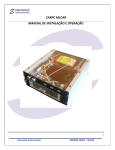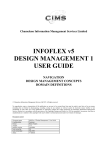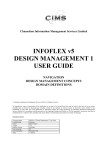Download VQ Finder User's Guide - NHS Education for Scotland
Transcript
access Making the most of new resources to support your learning Winter 2011/ 2 0 1 2 VQ Finder User’s Guide Four-page pullout section inside Page 1 ACCESS, the newsletter of the NES ACS Programme – supporting the people who make the system work. Welcome to the Winter 2011 edition of ACCESS. 2011 has been a very busy year for NES’s ACS team, with the launch of new resources and new projects all aimed at supporting the learning of NHS staff in administrative and support services roles. In this edition of ACCESS you can find out about these new developments, including a special 4-page pullout: The VQ Finder User Guide. The VQ Finder is a new website designed to help you decide if there’s a qualification out there for you. Some of the other resources featured in this edition include: The Admin Centre goes live! 3 Building career pathways through skills mapping 4 Questions of quality 6 The Admin Centre, the new one-stop shop of resources and information for staff working in administrative roles in NHSScotland VQ Finder User Guide: 4-page Pullout Workbooks for Facilities Services Staff launched by Health Facilities Scotland and supported by NES How my job makes a difference The Administrator’s Guide to The Quality Strategy & Quality Improvement, designed to show how the national policy and strategy for NHSScotland relate to the work which administrative staff do – and how they can help you highlight the importance of your work! In addition to these new resources, ACCESS also provides you with an update on a range of development projects supported by the NES ACS Programme. These range from projects supporting staff to achieve qualifications related to their role through to the development of wider support for career development in administrative and support services areas. If you are interested in finding out more about the resources and projects described in ACCESS, please contact us at [email protected]. And remember that we always need your feedback on ACCESS itself – so if you have any ideas which you would like to see featured in future editions, please let us know! To order hard copies of ACCESS, or to join our mailing list, please contact the ACS Team at [email protected] Page 2 Contents 11 Moving forward in facilities management12 New workbooks for facilities services13 Introducing the nhs vlq network14 Working with personal information 14 Individual learning accounts 15 Calling all finance staff! 15 On the road with the acs team15 © NHS Education for Scotland 2011. You can copy or reproduce the information in this document for use within NHSScotland and for non-commercial educational purposes. Use of this document for commercial purposes is permitted only with the written permission of NES. The Admin Centre goes live! In the Spring 2011 edition of ACCESS we told you about the development of a new website for administrative staff in NHSScotland. The ACS team is pleased to announce that the new website went live in June, providing access to a wide range of resources to support administrators across Scotland. The Admin Centre is a one-stop shop of information and resources to support your work, learning and career development. In the Working section you can access resources to support your everyday work. These resources include free access to guidance and bite-sized chunks of learning to support a wide range of areas, from planning and organising your workload through to learning resources to help your Microsoft Office skills. This section also contains information about national policies and how the work of administrative staff supports these. The Learning section highlights the importance of learning in the workplace. The information and resources provide support for everything from how to recognise what you are learning from everyday work through to guidance on how to get back into formal learning for qualifications. As well as providing resources to support your own learning, it also provides information about how to support the learning and development of others. If you are managing others, or providing guidance for other colleagues, the resources in this section can help you develop your own skills at the same time. The Careers section of The Admin Centre is designed to help you see what other opportunities might exist for you in NHSScotland. Administrative services cover a huge range of different professional areas – but sometimes it can be difficult to see where you might go next. This section of the website gives you some insight into a range of professions which sit within business and administration, as well as support for your own career planning skills. As with all resources developed within the ACS Programme, The Admin Centre can only develop with your help. We need your feedback to let us know what is working well, what is not so successful, and where there might be gaps. You can help us by: clicking on the ‘I found this useful’ button on the website when you find something you like completing the User Survey (accessible on the homepage) emailing us with your suggestions via the Contact Us button. And finally, remember that there are lots of administrative staff in NHSScotland. Help us spread the word by telling your colleagues about The Admin Centre! Access The Admin Centre at www.theadmincentre.nes.scot.nhs.uk. Do you work in Support Services? Then a partner website is being developed to support your work. Consultation on what should be included in the Support Services website begins in January 2012. If you would like to contribute to the consultation, email [email protected] for details Page 3 Building career pathways through Skills Mapping Before you read this article, try this little test. What words do you immediately think of when you hear the word ‘job’? Make a note of them. Now do the same with the word ‘career’. How do the words differ? It’s likely in your ‘job’ list, you have words like ‘pay’, ‘routine’ and ‘day-today’, whilst your ‘career’ list may feature words such as ‘future’, ‘development’ and ‘progression’. So how can jobs in NHS administrative and support services turn into careers? Over the past two years, the ACS team has been working with a number of NHS Boards to look at this issue. This work has been taking place in the Administrative Core Skills project and in the Career Pathways for Support Services project. At the heart of both projects has been a process called ‘skills mapping’. Skills mapping involves looking at the work which is carried out in a wide range of roles in administrative services and in support services in order to identify the different types and levels of skills they require, and how these develop Page 4 Understanding Skills in Support Services – Mapping skills in ‘soft’ and ‘hard’ facilities management In the Spring 2011 edition of ACCESS, Elaine Pacitti of the ACS team wrote about the Career Pathways Project for Support Services. The first phase of this project – two skills maps for support services – is almost complete. As Elaine explains, the maps provide some important information about the skills needed at different levels in support services: ‘We decided to develop two maps, one for ‘soft’ facilities, which includes areas such as catering, laundry and domestic services, and the as levels of responsibility increase. The aim of both skills maps is to help individuals, managers and planners recognise core skills – that is, skills which can be transferred across a wide range of roles – and how these can be developed. Having a clear other for ‘hard’ areas such as trades and estates. We needed to separate them as these two areas provide very different career opportunities for staff. However, the really important findings from the mapping have been around the amount of skills which are shared across the different service areas covered in each map and, in particular, the level at which people begin managing others. We find a lot of ‘soft’ facilities staff in Band 3 have management responsibilities, and it’s hoped that the skills map will provide support for them to develop the skills they need for these management roles.’ understanding of how these skills can be transferred across different areas of the service can help identify new career options for staff in those services, and help employers plan more effective development programmes. Understanding Administrative Skills – Personal Assistants in NHS Borders As part of the Administrative Core Skills project, NES funded a series of demonstrator projects to test out the Administrative Skills Map. One of these was in NHS Borders, where the skills map was used to help develop a learning programme for Personal Assistants (PAs). Project lead Julie Roberts explains: ‘Our aim was to ensure that PAs from different areas of the Board had consistent levels of core administrative skills, and that they could work together to create consistent ways of working. In this way, PAs would be better equipped to provide cover for each other at holiday times, and they would see where opportunities might exist in other areas of the Board. Working with Borders College, we used the skills map to define the core skills needed and created a learning programme around these. PAs participating in the programme completed a Professional Development Award (PDA) in Office Administration at SCQF Level 7. This was important because, for most of our PAs, learning has been carried out on the job and there has been no certificate to say ‘Yes, these skills are recognised’. Gaining a recognised qualification for skills they have developed at work has really boosted their confidence. We’re still working on developing shared operating procedures but our PAs have now seen what they have in common with others working in other areas of the service.’ Staff at NHS Borders celebrate the success of PAs who have completed the PDA in Office Administration The skills mapping projects will be the focus of consultation events to be held in Edinburgh and Glasgow in January and February 2012. For more information about the event, email [email protected] For more information about the PDA in Office Administration at SCQF Level 7, visit the Administration & Business section of the VQ Finder www.vqfinder.nes.scot.nhs.uk Page 5 Questions of Quality Introducing The Administrator’s Guide to the Quality Strategy & Quality Improvement. If you work in an administrative role in NHSScotland, you are one of around 30,000 people who have a pivotal – but often hidden - part to play in helping the service to deliver the ambitions of the Quality Strategy. strategy and quality improvement methodologies, along with short case studies which illustrate how administrative staff in different roles contribute to high-quality services. In addition, there is guidance on what you can do to help drive improvements in your own area of the service. This strategy outlines the Government’s aims to make the NHS in Scotland a service which is safe, effective and responsive to the needs of the individuals who use it. At times, it can be difficult to see how a national policy relates to you, and how your work can contribute to these goals. Now, however, help is at hand in the form of The Administrator’s Guide to the Quality Strategy and Quality Improvement. The Administrator’s Guide has been produced as a result of joint work between the ACS Programme and the NES Quality Improvement Team. In the view of Shona Cowan, Programme Director for Quality Improvement Education, ‘Quality is the business of every member of NHS staff, and administrative staff are vital to the process of quality improvement. In many areas of the service, it is the administrators who see where blockages occur and where the service might be improved. The Administrator’s Guide helps individuals see how their role supports this important national initiative, and shows how they might contribute to improvement activities. As a result, it can help raise the profile of the important contributions which administrators make to high-quality services.’ This new guide is designed to help administrative staff recognise how their own work contributes to the Quality ambitions of safe, effective and person-centred care. It also provides information about the methods which NHS Boards are using to improve the quality of services. In the guide, you will find summaries of both the Page 6 The Administrator’s Guide to the Quality Strategy and Quality Improvement is available online. It can be downloaded from the Working section of The Admin Centre www.theadmincentre.nes.scot.nhs.uk It is also included in the information and resources to support quality improvement housed in NHSScotland’s Quality Improvement Hub www.qihub.scot.nhs.uk The VQ Finder Helping you to navigate the world of vocational qualifications What is the VQ Finder? The VQ Finder is an online database of vocational qualifications available in Scotland and relevant to NHSScotland staff. It includes details of more than 300 qualifications, including HNCs, HNDs, SVQs, Professional Development Awards (PDAs), Modern Apprenticeships (MAs) and other qualifications from SCQF Level 4 upwards. How to find what you Finding the right qualification To find which qualification is best for your situation: ● Click on the relevant job family and, where relevant, sub-family. You will see the titles of all of the qualifications relating to that family, organised by level and type of qualification. ● Click on the title to see more details of the qualification. These details include information about the mandatory requirements of the qualification. ● For further details, click on the link to the awarding body. ● Links to learning providers for different qualifications can be found in the ‘Learners’ and ‘Employers’ Sections of the VQ Finder. Case Studies This section illustrates the learning journeys which individuals have undertaken in different job families, and how completing qualifications has supported their career development. www.vqfinder.n need on the VQ Finder Qualifications explained Helping you to understand the qualifications system Information in this section includes: ● What are Vocational Qualifications? - A guide to the different types of qualifications available ● What is the SCQF? – An introduction to Scotland’s ‘national language’ for describing learning and qualifications ● How are VQs developed & delivered? – A guide to the roles of learning providers, awarding bodies and others in the education sector ● Recognition of prior learning – How to build on experience when working towards qualifications ● Answers to frequently-asked questions (FAQs) about qualifications Information for learners & employers Helping you to make decisions about how best to study. Information in these sections includes: Information for learning providers Helping learning providers to understand the learning needs of NHSScotland. This section includes information about the structure of NHSScotland, the role of the NHS Knowledge & Skills Framework, and how NHSScotland supports staff learning and development. nes.scot.nhs.uk ● Why do a qualification? – A guide to the benefits of gaining qualifications, both for individuals and for the organisation ● What’s the starting point? – How to decide what needs to be learned ● Which qualification is right for me/my staff? – How to choose the most appropriate type and level of qualification for your context ● What funding is available? – A guide to different sources of funding for learning ● Where can I / my staff go to learn? – Links to a wide range of learning providers The Employers’ section also provides guidance on commissioning qualifications for the workplace. Who is it for? The VQ Finder provides information to support a wide range of NHSScotland staff, including: ● INDIVIDUALS wishing to complete a qualification for their own professional development ● MANAGERS looking for the most appropriate qualifications for their staff ● PLANNERS seeking to identify the most appropriate qualifications for a particular staff group ● RECRUITERS looking for information about the qualifications which people might bring with them into the NHS. The VQ Finder also provides an important insight into learning for different roles in NHSScotland. This makes the VQ Finder a useful tool for learning providers, careers guidance professionals and individuals who are considering careers with NHSScotland. Making the most of vq finder resources The VQ Finder allows you to access a wide range of resources to help you and your colleagues make the most appropriate decisions about qualifications for your context. Clickable Tools A number of tools have been built in to the VQ Finder to help you navigate the qualifications landscape. Some of these include ● an interactive guide to the Scottish Credit & Qualifications Framework (SCQF), which you can access to help you navigate levels of qualifications ● a guide to different types of qualifications, available in the Qualifications Explained section ● a comprehensive search facility. Access to a wide range of nhs education for Scotland (nes) resources NES has produced a range of resources to support the learning of staff working in support roles across NHSScotland. These range from web resources to support a wide range of learning needs through to leaflets and guides designed to help individuals and their managers make the best decisions for their context. Links to NES resources can be found in the ‘Learners’ and ‘Employers’ sections of the VQ Finder. Links to partner organisations The VQ Finder has been developed by NES, working in partnership with the Scottish Qualifications Authority (SQA) and a range of other organisations. Each partner organisation links to the VQ Finder via a specially-designed landing page on their own website. This makes it easier to find what you are looking for on partners’ websites. Opportunities to contribute to the development of the vq finder You can support the development of the VQ Finder by completing the User Survey on the home page, or by telling us which pages are most useful. Simply click on the ‘I found this useful’ button on the web pages to let us know. You can also contact the VQ Finder team by clicking on Contact Us at the top of each web page. NHS Education for Scotland Floor 5, Thistle House 91 Haymarket Terrace Edinburgh EH12 5HD T: 0131 313 8000 F: 0131 313 8001 Version 1 Published December 2011 [email protected] www.nes.scot.nhs.uk How my job makes a difference Staff working in administrative roles provide important support to the delivery of effective, safe and person-centred healthcare services. However, with many of those roles hidden from the public eye, it can sometimes be difficult to see how they relate to high-quality patient care. One of those hidden roles is that of clinical coder – but what do clinical coders do? Gillian Geddes of NHS Greater Glasgow & Clyde told ACCESS about her work. Q What exactly is ‘clinical coding’? A The coding process itself involves the translation of medical terminology into codes to be used for both statistical and clinical purposes. My main duties involve the extraction, translation and recording of patient information. Q What kind of tasks do you carry out on a day-to-day basis? A As a clinical coder, I have to create records which most accurately reflect the diagnoses made and the procedures and interventions carried out during the patient’s stay in hospital, or during their outpatient or day-care attendance. This information is extracted on a daily basis from discharge letters, case notes, and other reports (such as pathology/lab reports) to gain an accurate and complete picture of the patient’s condition. Once extracted, this information is translated into a code form which can be read by computer. I do this by referring to statistical classifications which ensure that the most appropriate codes are applied. Finally, the codes are recorded on an NHS database. Q What training do you need for your job? A When I started in my post, I attended training in how to use the ICD10 and OPCS4 statistical classifications needed for accurate coding. However, learning how to extract the relevant information and apply the codes is mostly done ‘on the job’ and monitored by colleagues. Q What’s the most challenging thing about your job? A The most challenging aspect of my job is the interpretation and extraction of patient information. Accurate coding depends on good quality information being provided by doctors and clinical staff. However, sometimes discharge summaries are incomplete, with not enough information included. As a result, coders need to search case notes, scans and lab reports to find the information needed to allocate an appropriate code. With pressure on to meet deadlines for submission of information to ISD Scotland, the extra work which this involves can create challenges. Q What’s the best thing about your job? A The best thing about my job is how much I’ve learned through time about medical terminology, human anatomy and physiology. You learn a lot about different hospital specialities and the types of operative procedures and treatments carried out on a daily basis. Q How do patients and other service users benefit from the work you do? A The information collected and recorded by clinical coders is used by clinicians and managers to help plan and manage healthcare services within the NHS in Scotland. By tracking patients’ needs and interventions, they can see how patterns of services are being used – and what new services might be needed. The information is also used by clinicians to aid research, so that the service can develop in response to the needs of patients. Q And can you tell us – how does your job make a difference? A Clinical coders play an important role in helping NHSScotland understand and respond to the changing needs of patients. Without the information we provide, the work of identifying what services patients need would be much more difficult. To find out more about how administrative roles make a difference to the quality of healthcare services, visit the Careers section of The Admin Centre www.theadmincentre.nes.scot.nhs.uk Page 11 Moving forward in Facilities Management NHS staff pilot the new SVQ3 in Facilities Management The Skills Mapping projects featured on pages 4 and 5 have helped to highlight the management skills required by many administrative and support services staff working at Bands 3 and 4. Now a new project, funded by NES and supported by Health Facilities Scotland, aims to help staff gain recognition of their current skills and to develop them further. In July 2011, a group of 19 supervisors and managers from support services in five NHS Boards embarked on a brand new qualification. The SVQ3 in Facilities Management is designed to help individuals develop their knowledge and skills in managing a range of areas in facilities. From managing people to managing resources and Page 12 processes, the qualification is designed to enable participants to demonstrate how their management skills meet national standards. The aim of the pilot, however, goes beyond the achievement of a single qualification. Janet Garcia, Head of Business Services at Health Facilities Scotland, hopes that the SVQ will help participants to go on to develop the skills needed to compete for higher-level management jobs. “The SVQ3 could provide an important stepping stone for staff whose learning, until now, has been primarily on the job,” she says. “By gaining recognition for their existing skills through taking part in a formal learning programme, these staff can start on a learning journey which could help them develop higher-level management skills. We know that, in a few years, many senior managers will be retiring from support services and we need to provide opportunities for those in lower grades to develop the skills they need to progress in management.” The SVQ programme is being delivered by Telford College, with participants from different areas of Scotland completing a distance learning programme supported by a series of visits from their SVQ assessor. The pilot is expected to conclude in summer 2012, when we hope to bring you information about the learning journeys of some of the participants. You can find out more about the SVQ3 in Facilities Management by visiting the Support Services section of the VQ Finder www.vqfinder.nes.scot.nhs.uk New Workbooks for Facilities Services In November, Health Facilities Scotland (HFS) announced the launch of a series of workbooks designed for staff in a range of facilities services. The Workbooks for Facilities Services staff have been designed primarily for new members of staff in catering, portering, linen and security services. However, existing members of staff can use the workbooks to identify any gaps in their knowledge or where they might need refresher training. What do the workbooks cover? All of the workbooks contain questions and tasks designed to help the individual staff member show that they can work safely and effectively in their own area of the service. Part A of each workbook is divided into three areas: Essential knowledge and skills for the service area (catering, portering, linen or security services) Health and Safety and maintaining a safe environment Providing a high-quality service Part B of each workbook helps the individual to focus on ways in which they can contribute to safe healthcare and minimise the risk of infection. The workbooks aim to help NHSScotland staff working in the same service area across NHSScotland demonstrate consistent levels of knowledge and skills. To help achieve this level of consistency, each workbook is accompanied by a Manager’s Guide. The Manager’s Guide details the type or level of knowledge which the individual needs to demonstrate to meet the requirements of each question or task. By using the Manager’s Guide to support their review of the individual’s workbook, the line manager or supervisor who is supporting the staff member can be sure that they are applying the same standards to that review, wherever they may be working. Importantly, the workbooks also link directly to the Healthcare Support Worker’s (HCSWs) Induction Standards and the NHS Knowledge & Skills Framework, and the evidence they provide may also be used if individuals are working towards an SVQ. Information about all of these links can be found in Introducing Facilities Services Workbooks, an explanatory leaflet. The leaflet and workbooks can be accessed on the HFS website. For more information and to access the workbooks, visit www.hfs.scot.nhs.uk/onlineservices/publications/facilities/ workbooks/ Full information about The Healthcare Support Workers’ Induction Standards can be found at www.HCSWtoolkit.nes.scot.nhs.uk Page 13 Introducing the nhs vlq network In-house support for vocational learning and qualifications Vocational qualifications (VQs) are very much in the spotlight at the moment. Focused on the knowledge and skills people need for work, and often completed in the workplace, VQs can provide valuable recognition of what NHS staff know and can do. The NHS Vocational Learning & Qualifications (VLQ) Network brings together representatives from all NHS Boards which offer SVQs (and other qualifications) through their in-house centres. By working together, the Network has been able to: share learning and expertise to help NHS Boards run VQ programmes effectively One of the ways in which many NHS Boards support access to VQs is through their own in-house qualifications centres. NHS VQ centres were originally established to ensure that NHS staff could undertake Scottish Vocational Qualifications (SVQs) in the workplace. However, in the past few years, the individuals who run the VQ centres have built up a vibrant network. This helps ensure that the NHS benefits from the knowledge and expertise of staff members who understand the world of vocational qualifications and can make links to wider initiatives such as the Quality Strategy. influence the development of national education frameworks such as the resources to support the Healthcare Support Workers’ Induction Standards ensure that educational bodies such as the Scottish Qualifications Authority (SQA), City & Guilds and Scotland’s Colleges understand some of the challenges facing NHSScotland, and work with the Network to overcome them work with NES to ensure that the value of SVQs to NHSScotland as a whole is better understood. Maggie Byers-Smith of NHS Lothian is the Chair of the NHS VLQ Network. She has no doubt about the value of the network’s activities. “The NHS VLQ Network does a lot of work behind the scenes to help ensure that NHS Boards get the best out of vocational qualifications. However, perhaps more importantly, we also provide expertise in our own Board areas. For example, we can help out if managers or individuals want to know if particular programmes are running – or can be run – within the Board area. Unfortunately, in some areas, staff aren’t aware that their Board actually has an in-house VQ centre, and so their path to an appropriate qualification can become a lot more complicated. We would always recommend that staff who are seeking qualifications – either for themselves or for the people they manage – look on their Board’s intranet for information about the in-house VQ centre.’ To contact your local member of the NHS VLQ Network, visit the VQ Finder (Learner’s Section) and click on ‘Where can I go to learn?’. To access the 2010 NES report ‘Review of the use of SVQs by NHS Boards’, visit www.nes.scot.nhs.uk Working with personal information Are you working safely? Does your work involve handling personal identifiable information relating to patients or staff? If so, then a new guide published by the Scottish Government Health Department is for you. Holding, Obtaining, Recording, Using, and Sharing Information: A Guide for Health Administrative Staff provides the information you need to ensure that you are handling information securely and appropriately. You can access the guide via the Working section of The Admin Centre. Page 14 To access the guide, go to the Working section of The Admin Centre and click on ‘Handling information safely’. www.theadmincentre.nes.scot.nhs. uk/working.aspx Individual Learning Accounts Keep up with the changes – and make the most of available funding In previous editions of ACCESS, we have highlighted how useful Individual Learning Accounts (ILAs) can be in helping you to fund your learning. ILAs of £200 are available to people who earn less than £22,000 per year, who are resident in Scotland and who wish to enrol on an ILA-approved learning programme. However, there have been some changes recently to the ILA500 – a grant of £500 for people studying on approved programmes at SCQF Level 7 (e.g. HNC / Professional Development Awards etc) or above. The ILA500 has now been changed to the Part Time Fee Grant, but is still available to people who are studying part-time and earning less than £22,000. If you are about to begin a programme of study and meet the earning requirement, you should check if your programme is ILA approved – and make the most of the funding available to you. Calling all Finance staff! Are you linked in to The Finance Network? Earlier this year, the NHSScotland finance community launched its own online community - The Finance Network. The space provides an easy means of helping finance staff collaborate and support each other. The website aims to: encourage discussion and debate on professional issues help link individuals and teams working in finance departments across NHSScotland promote the sharing of knowledge, experience and resources provide resources for KSF and staff development The website is still a work in progress and the development team are keen to gather feedback on this resource. Elaine Lawther, from the Finance Training & Support Unit at NES says “It has great potential but we feel there is something missing. We really would welcome comments. It would be even better to see finance colleagues use the site to share ideas and resources. There are a few discussion boards on the go, but the more views we have, the better it will be.” To access the community space, visit www.knowledge.scot.nhs.uk/finance.aspx or follow the link from the Finance page in the Careers Section of The Admin Centre. To find out more about the Part-Time Fee Grant, as well as other funding available for those studying part time visit the Funding section of the Student Awards Agency Scotland (SAAS) website www.saas.gov.uk/student_ support/special_circumstances/ part_time_dl.htm#fee_grant For more information on ILAs, visit www.ilascotland.org.uk You can access all of this information by following the links from the Learner’s section of the VQ Finder. On the road with the acs team As you will have seen from this edition of ACCESS lots has been happening within the ACS project. We hope that you will look at – and use – some of the resources which we have featured this time round. We are also very keen to hear your views about some of the resources and materials which have been developed. In order to showcase the resources and hear your views, Elaine Pacitti and Karen Adams of the ACS team will be visiting a number of NHS Boards over the next few months. If you feel that groups of staff in your NHS Board would like to meet the team and discuss the resources, please let us know by emailing [email protected]. We can let you know if there are plans for us to be in your area – and, if there aren’t, we can discuss what might be arranged. In the meantime, don’t forget that there are other ways to let us know what you think, by: completing the surveys and clicking the ‘I found this useful’ links on the VQ Finder and The Admin Centre emailing us at [email protected] We hope you like the resources introduced in ACCESS - and remember, we need your help to develop them further. Page 15 Different format required? This resource can be made available, in full or summary form, in alternative formats and community languages. Please contact us on 0131 656 3200 or email [email protected] to discuss how we can best meet your requirements. 0131 656 3200 [email protected] 0131 656 3200 [email protected] [email protected] [email protected] 0131 656 3200 0131 656 3200 Ten material może być udostępniony jako streszczenie lub pelen tekst w innych formatach i językach. Promisy o kontakt pod numerem telefonu 0131 656 3200 lub pocztą elektroniczną pod adresem [email protected] by przedyskutować Państwa konkretne wymagania. NHS Education for Scotland Westport 102 West Port Edinburgh EH3 9DN Tel: 0131 656 3200 F: 0131 656 3201 [email protected] www.nes.scot.nhs.uk Published December 2011

























![Lifts Part 4: Operational Management [PDF 707Kb]](http://vs1.manualzilla.com/store/data/006003154_1-8f988a4c31a2e96372488ae8439271db-150x150.png)